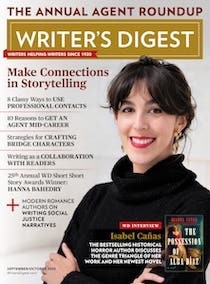7 Things I’ve Learned So Far, by Jeanne Ryan
Outside of personal experience, the best way to learn is to get advice from people who’ve been there and done that. Discover the seven things learned so far by author Jeanne Ryan.
This is a recurring column called “7 Things I’ve Learned So Far,”where writers (this installment written by Jeanne Ryan, author of the young adult debut novel, NERVE) at any stage of their career can talk about writing advice and instruction as well as how they possibly got their book agent -- by sharing seven things they’ve learned along their writing journey that they wish they knew at the beginning.
1. Learning to write synopses well is a golden skill. You’re probably aware that if you can master these little guys, you’ll have a leg up on selling manuscripts on proposal, competing in writing contests and applying for grants. But did you know they can also play a big role in selling subsidiary rights? Foreign publishers often send manuscripts to translators for a reading report before they’ll decide on a purchase. Translations cost money, which means it’s more economical for interested publishers to work off of a synopsis first. Need more motivation? Movie agents don’t have time to read every book that crosses their desk. So a well-written synopsis can be the bait they need to lure them into placing your book at the top of their TBR pile. Next time someone claims that synopsis-writing is Satan’s pet torture device, keep in mind they’re really golden keys to some divine opportunities.
2. As you master your writing, master something else too. Enduring the boot camp known as “trying to land a book deal” is often a multi-year effort. In my experience, it helps to use this time to work on another passion as well. Sometimes we can’t detect improvement in our own writing for ages, so pick an extra-curricular activity where you can see incremental change. For me, the activity was hooping, (think grown up hula hoops). After a rough day in the rejection trench, I could practice a new trick, have fun and see tangible results for my efforts. (If you’re curious about what hoopdance is about, check out this video of someone I consider a master hooper.)
3. Make peace with the delete key. Years ago, I heard a writer giving words of wisdom at a conference. Her message was “Your words are not precious.” I so wish I could remember who that writer was and if she was in turn quoting someone else (I believe she was, and would love it someone could provide the correct attribution). As I battle my way through revision after revision, which has only become more challenging with books under contract and their many deadlines, I’ve accepted that there will often be times where I have to throw out huge chunks of writing that took months to complete. The longer you spend kicking and holding tightly to stuff that isn’t working, the longer it’ll take to figure out what does. I’m not sure it ever gets less painful, but you can always keep the deleted stuff in a salvage file. Often, bits and pieces will find their way back into your manuscripts.
Order Jeanne Ryan's Nerve today.
4. Get familiar with one or more plotting systems. I spent years pantsing before I learned the benefits of a plotting structure. This doesn’t mean killing off your creativity, more a matter of building an innate sense of how the energy of a story should flow. Become a student of three-act structure, eight-point screenplay structure, Save-the-Cat Beat Sheets, the hero’s journey, or whichever method speaks to you at a particular time. The more you study, the more of a feel you’ll develop for when a story isn’t starting in the right place or when your main character isn’t propelling toward key events.
5. Find a foolproof way to get words on paper when you absolutely have to. My goto software is writeordie.com (which should pay me a commission for how often I recommend it). Other folks swear by Written?Kitten! The main thing is to find a way to turn off that pesky inner editor.
6. Don’t be afraid to ask experts. I’m a total introvert, so this one is a challenge. But so far I’ve interviewed people on a wide array of subjects: liver transplants, internet privacy, shipping crane operation, and gene therapy, to name a few. I have yet to find a person who didn’t agree to let me ask a few questions on their area of specialty. If you’re still afraid of rejection, I highly recommend watching this guy’s videos on his hundred days of “rejection therapy”. Great motivation for amping up your own game.
7. The quest for publication should not exclude all the other things in your life. Remember to be grateful for and enjoy your family, friends, and health. Everything else, including a book contract, is frosting.
Jeanne Ryan is the author of NERVE, a young adult thriller published by Dial/Penguin in September 2012. School Library Journal said, “Ryan questions the nature of entertainment and explores the concept of privacy in a world of increasingly sophisticated social media. Teens will find themselves drawn in by the story's possibilities, and unNERVEd by its outcome. Give this to Suzanne Collins's Hunger Games fans.” It was included on the LA Times Fall 2012 roundup of young adult fiction and will soon be released in six foreign editions.



